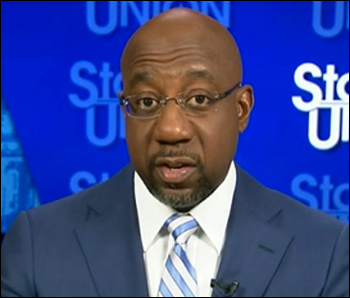Aug. 11, 2021 — Late last week, Public Policy Polling released their new Georgia Senate findings (Aug. 4-5; 622 Georgia voters, interactive voice response system) and the results place the new Peach State Senate race in familiar territory: a virtual tie.
While PPP finds that freshman Sen. Raphael Warnock (D) leads three tested Republican potential nominees, former Sen. Kelly Loeffler, retired football star Herschel Walker, and three-term state Agriculture Commissioner Gary Black, only when paired against Black does Warnock’s edge extend beyond the polling margin of error. This early poll suggests what the conventional political wisdom already predicts, that the 2022 Senate race will again feature a close finish.
To reiterate, Sen. Warnock, though winning his seat only in 2020, must run for a full six-year term next year because he won the special election to fill the unexpired portion of former Sen. Johnny Isakson’s (R) final term. You will remember that Sen. Isakson resigned at the end of 2019 due to health reasons and Gov. Brian Kemp (R) appointed Loeffler to fill the seat until the special election was conducted.
The PPP results find Walker, who has yet to announce (and it’s still even unclear as to whether he will run), in the best position of the three tested potential candidates. In this poll, Sen. Warnock’s edge is 48-46 percent. Loeffler fares comparably with Walker, though slightly worse, trailing 44-47 percent. Commissioner Black, the only officially announced candidate of the group, falls behind by eight percentage points, 38-46 percent.
The favorability indexes provide further clues. Keeping in mind that almost everyone tends to skew negatively on the PPP favorability scores, the two benchmarks, President Biden and former President Trump, score 46:48 percent favorable to unfavorable and 43:48 percent, respectively. Sen. Warnock posts a 43:42 percent job approval score. Walker, obviously exclusively due to the personal recognition coming from both his college and professional football career, has the best result: 41:28 percent. Loeffler fares poorly: 28:47 percent, while Commissioner Black is an even split at 15:15 percent; still, that means 70 percent of the voters don’t have enough information about him to form an opinion.
These numbers provide us with several conclusions: first, Sen. Warnock has yet to establish himself beyond a partisan framework. The 85:8 percent score among Democrats carries his overall positive mark. He records a predictable 6:78 percent mark among Republicans, but perhaps most indicative, just 33:45 percent among those classifying themselves as political Independents.
Secondly, Loeffler has the most surprising rating because it is almost universally negative. She is upside-down with women, men, Democrats, Independents, whites, blacks, other races, all age ranges, educational categories, and naturally Biden voters. Even among Trump voters and Republicans, her numbers are not particularly strong. She scores 53:20 percent favorable with Trump voters and 56:21 percent among Republicans.
Both of Loeffler’s positive figures are far below an acceptable base position. To contrast, Walker records a 72:7 percent positive ratio among Republicans and 70:9 percent within the Trump voter cell.
Despite her poor approval metrics, Loeffler’s ballot test of falling just three percentage points short of Sen. Warnock is more indicative of his standing than hers. In all the trial heats, even when he has a substantial lead over Black, Sen. Warnock fails to reach the 50 percent plateau.
In the 2020 election, Rev. Warnock scored a 51-49 percent win over then-Sen. Loeffler. He did so largely by outperforming his opponent in the strongest Democratic counties with a greater margin than Loeffler pulled from the best Republican counties. In the jungle primary election, with eight Democrats, six Republicans, and six Independent/minor party candidates on the ballot, the aggregate Republican vote was larger than the Democratic total: 2,426,120 to 2,378,312, a slight margin of 47,808 votes from a concurrent general election turnout model.
The other factor in the coming 2022 race is the expected governor’s race between incumbent Kemp and 2018 Democratic nominee Stacey Abrams. With Kemp weakened within the Republican base because of the post-election controversy, Abrams will likely be in stronger position than she was when losing the statewide contest three years ago, 50.2 – 48.8 percent.
The governor’s race will certainly affect Senate turnout, which may be a wild card factor in how the latter campaign unfolds. PPP did not release governor’s results in this poll but following the governor’s contest throughout the election cycle could provide as much tangential information about the Senate battle as does the specific race polling.

